
As we’ve discussed in a previous article Best Hotel Booking Apps and What Hotels Should Know About Them, hotels need to stay current with all the ways travelers book their lodging.
Below is a list of some of the most popular hotel booking sites and what hotels should know about them.
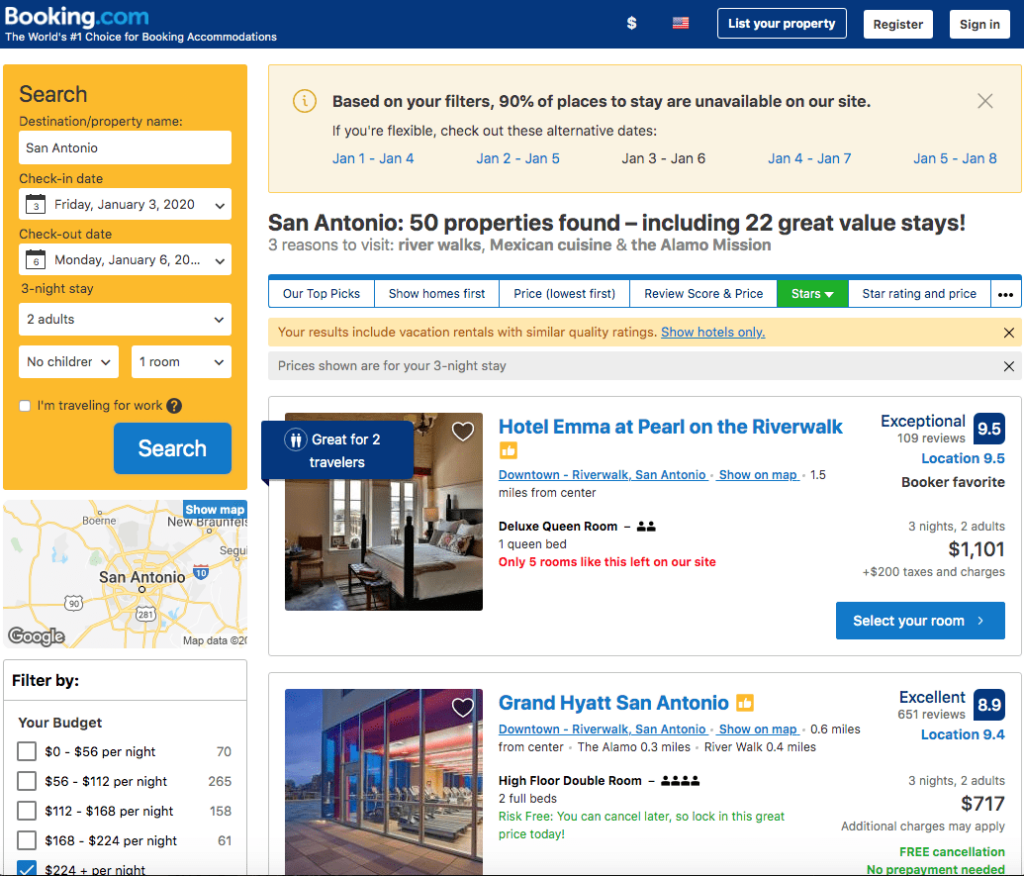
Booking.com
Booking.com offers an eclectic variety of prices, discounts with a broad mix of hotels, hostels, and apartments. While this wide spectrum might appeal to some searchers, the number of options might require the use of more filters to find the best fit.
Booking.com detects the traveler’s location (through their IP address) and auto-adjusts the language and currency. The interface design is very user-friendly, with clearly posted upfront costs for the budget-conscious shopper.
Hotels should know: The option to sort by price will often be the top query. If price-conscious customers matter to you, make sure your prices, all of your amenities, location info, deals, and reviews are accessible to all filers.
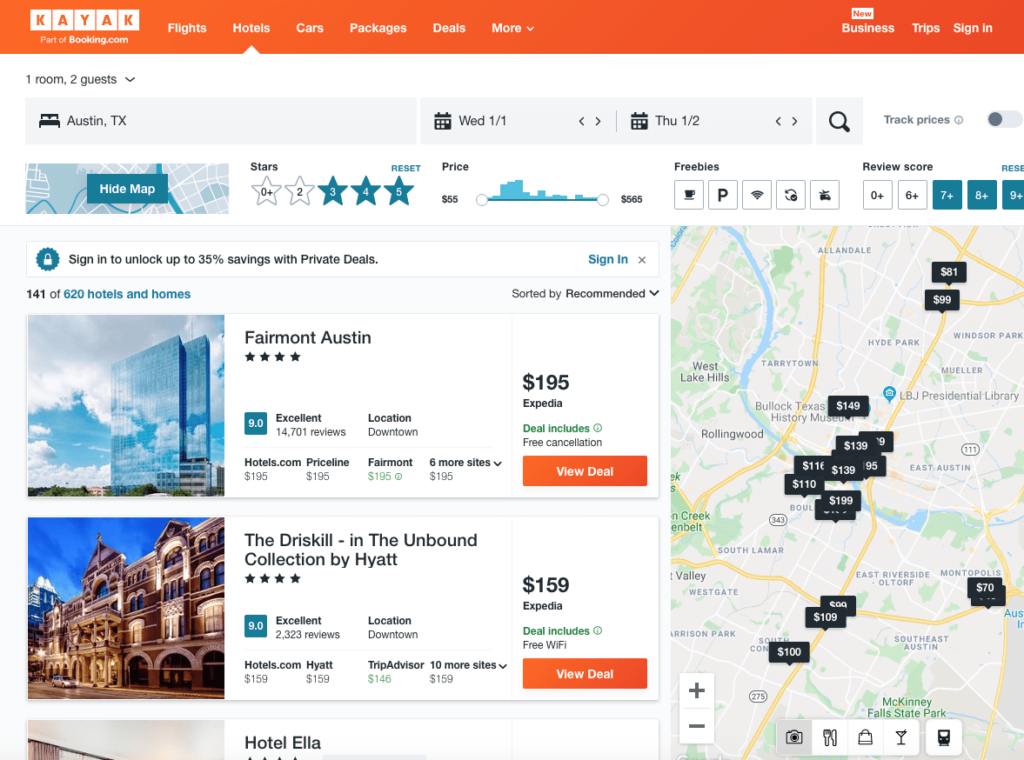
Kayak.com
Although Kayak is most popular for its flight searches, the hotel search is a clean, easy-to-use interface with many available filters. Kayak’s map features are very useful and Kayak offers one of the more seamless mobile experiences.
Kayak also offers an easy side-by-side hotel booking site comparison to compare rates and amenities in one place. While their hotel search is based on a vague factor of what’s “Recommended,” which is true of many hotel booking sites, this may offer content opportunities to hotels.
Hotels should know: Maps and mobile access are important to travelers.
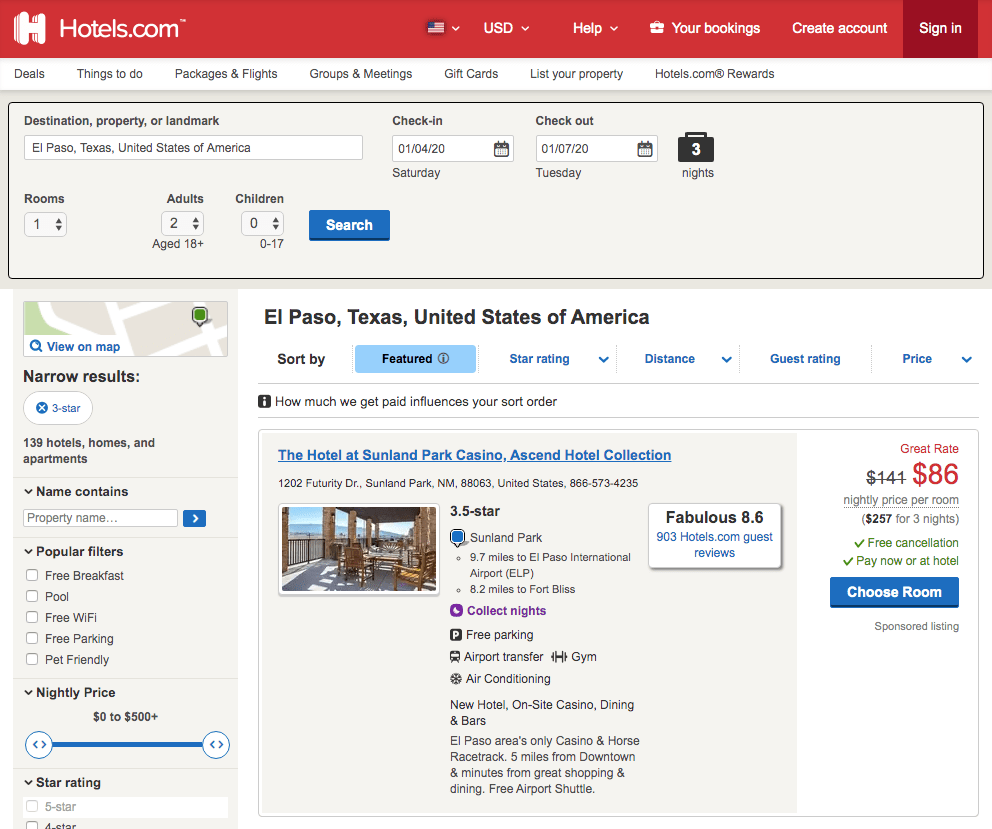
Hotels.com
Hotels.com works best for those searching the large hotel chains. Its initial results display a healthy balance of lower- and upper-end hotels, they are mostly in or around city centers.
Prices are on par with other OTAs. But the search results also included many grayed-out hotels trying to incite urgency which can backfire on with the customer experience. One of their best features is the number of filters.
Hotels.com offers more hotel search filters than most travelers could ever use, but the popularity of this feature highlights its relevance to travelers.
Hotels should know: Don’t bury your filter friendly content. Highlight your feature amenities, deals, and location information and all the boxes that searchers might be checking in their filters.
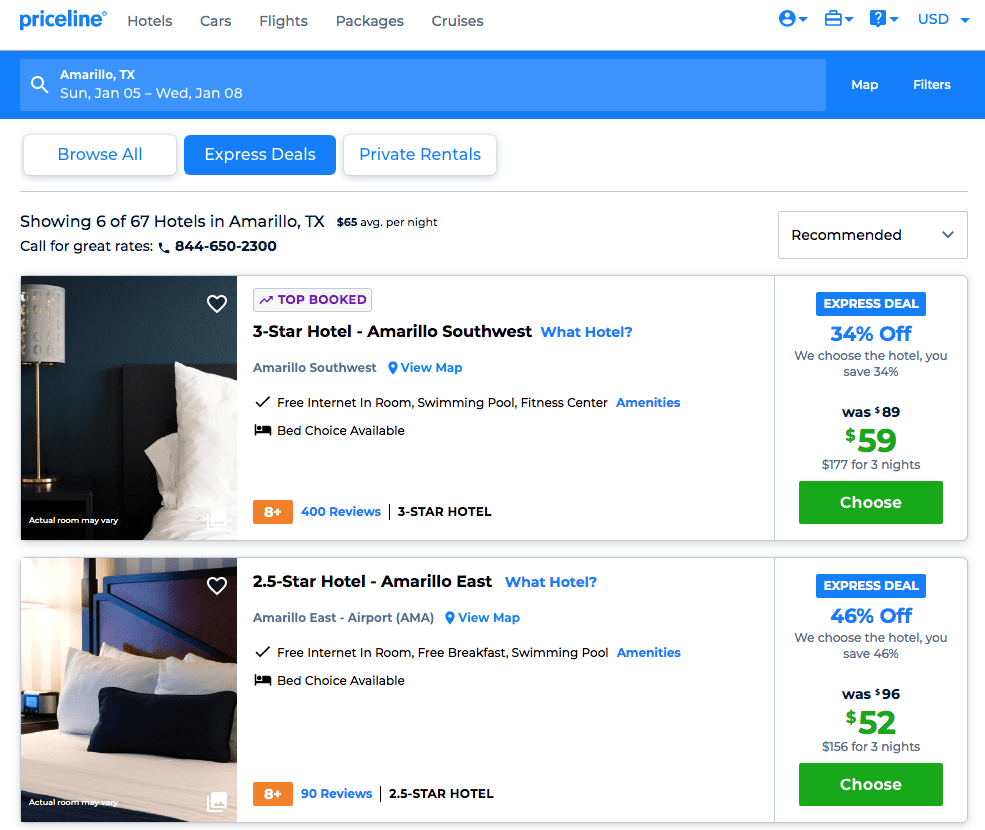
Priceline
Priceline works best for flexible travelers. It offers one of the more visually appealing design layouts among the major hotel search engines and is among the easiest hotel sites to navigate.
Priceline’s results focus largely on downtown and tourist-centric areas. The popular feature of Priceline is its unique “Name Your Own Price” and “Express Deal” options: One allows you to submit a final hotel price you’re willing to pay (which a hotel can then accept with a nonrefundable booking). The second is a flash deal that hides the name of the hotel until after you book. Although a bit gimmicky, these hotel search options can offer significant savings.
Hotels should know: Priceline’s “Name Your Own Price” and “Express Deal” features are major differentiators from other discount hotel sites. Make sure to promote any last-minute offers that might appeal to flexible travelers.
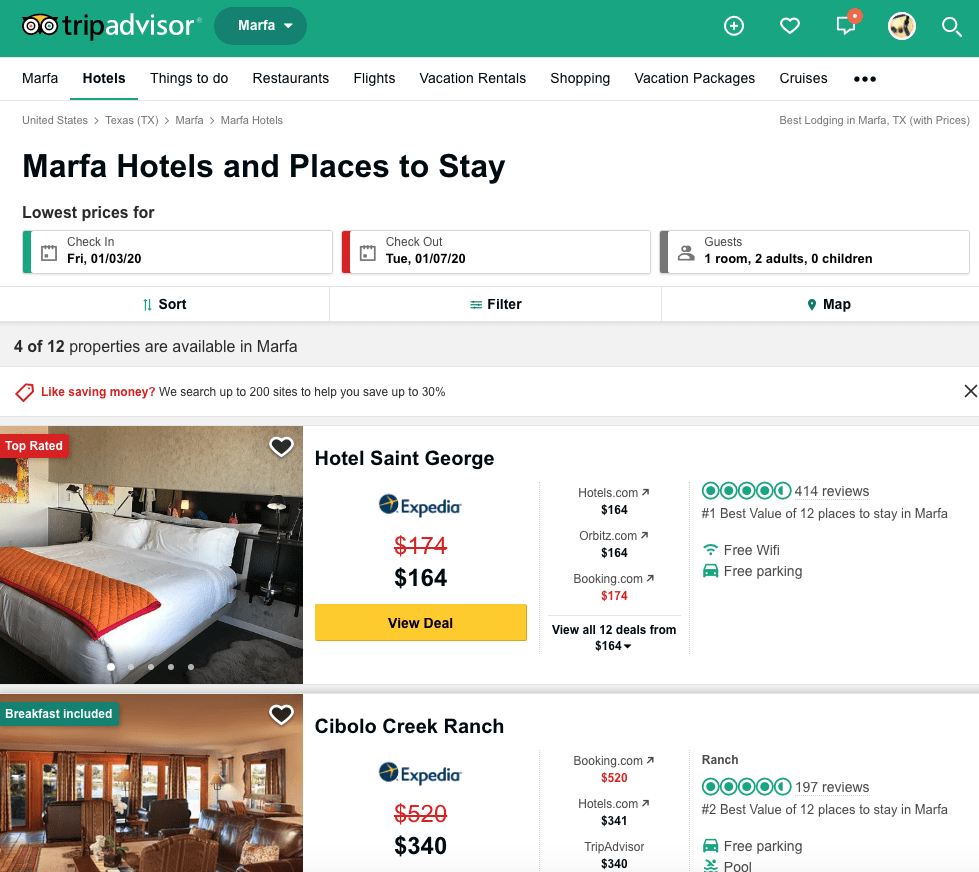
TripAdvisor
TripAdvisor‘s main appeal is its vast library of user reviews. Along with Hotel reviews, TripAdvisor also includes user content on ‘things to do’ and restaurant reviews.
While the hotel search displays some of the best hotel deals from a range of sites, the tool is also built right into TripAdvisor’s general search function with access to their highly-trafficked user reviews and photos.
Hotels should know: User reviews are very important to travelers. Find ways to incentivize your visitors to post photos and reviews on TripAdvisor of their experience both with your hotel and with their whole visit in your area.
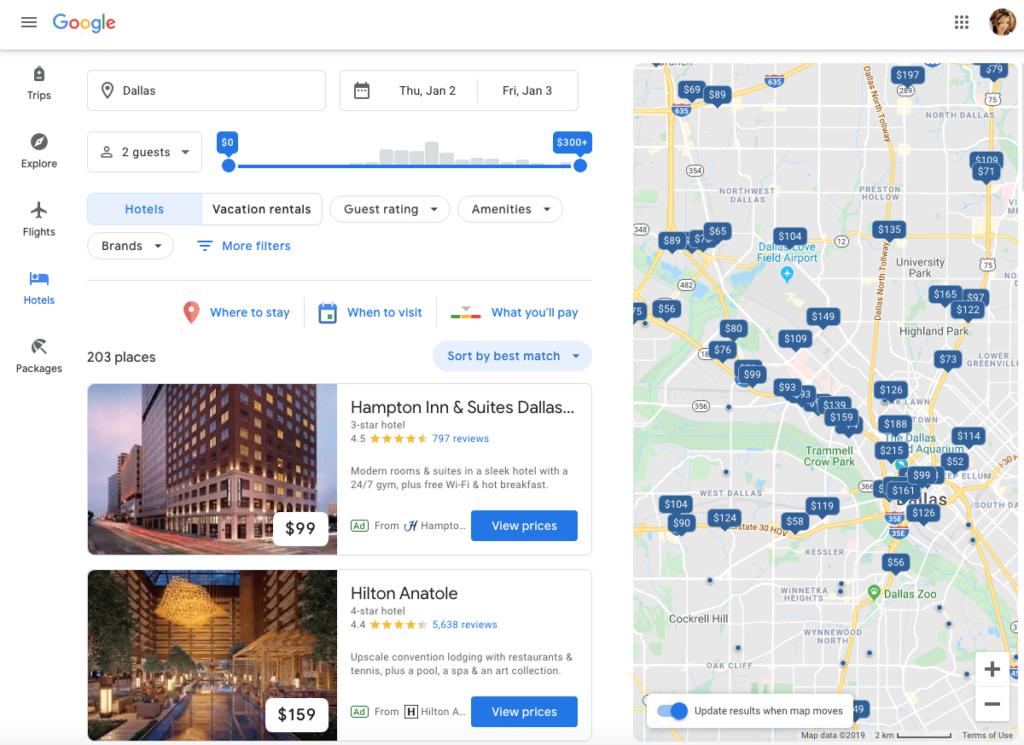
Google Hotel Search
As we’ve discussed in a previous article, Google’s entry into the travel industry is strong. Google’s extensive database of, well, almost everything, will make this a top resource for travel planning.
Google’s hotel search engine is simple but powerful. Its integration with Google Maps makes it very different from any of the other hotel booking sites listed above. Hotel locations are marked by prices on a map, rather than by name or any other identifying characteristic.
It’s no surprise that Google offers a no-frills hotel search engine for travelers who don’t want all the hard-sell aspects of cheap hotel sites and more commercial hotel search engines.
Hotels should know: Location, location, location — it’s usually pretty important when choosing a hotel. Google Maps integration, with satellite and street view, allows users to easily factor that into their hotel search.
What Hotels Should Do
In all of your promotions, highlight your loyalty points, elite or rewards programs, as these are usually unavailable when booking through OTAs. These programs can incentivize direct booking.
Encourage visitor reviews and photos, both on your own website and on sites like TripAdvisor.
Regularly review your information on all these sites to make sure all info is current and directly address any negative reviews where possible.
Many travelers will begin their research with 3rd party booking sites but will also check with the hotel directly to confirm they have the best deal. Make sure direct access to your hotel website is available where possible on all these sites.
Maximize your mobile access and content everywhere you can.
Check your Google listings for accuracy, especially all GPS/location mapping information.
Reference URLs:
https://upgradedpoints.com/best-websites-for-booking-cheap-hotels
https://santorinidave.com/best-hotel-booking-site
https://www.uponarriving.com/Hotel-Booking-Sites
https://templatic.com/wp/best-online-booking-sites/

